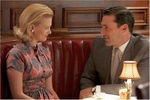Mad Men Gives Sixties A Branded Makeover
The following is a guest editorial by Tom Parrette is Director of Verbal Branding at Addis Creson on AMC's Mad Men as it relates to the reality of the sixties.
I'll admit it upfront, so diehard fans of AMC's Mad Men are forewarned: I'm one of the few people who's not completely infatuated with the show. But as someone who does branding for a living, I'm intrigued by how it reconstructs the ethos of an era using brands and pop cultural references.
It seems like Mad Men is based on a simple conceit: an ad agency, which delivers manufactured views of the world to a mass market, is presented to us through the same lens. The show is itself an advertisement for the early 60s, where looks and labels surpass world events in terms of significance. The show's producer David Chase, quoted in The New York Times the month Mad Men debuted, described it this way: "Here was... a story about advertising in the 1960s, and was looking at recent American history through that prism."
In Mad Men, we're given a distilled version of the past made accessible by physical setting. Events of the day, like the death of Marilyn Monroe, crop up as chronological markers but don't necessarily change the course of the drama. They are reminders of where we are historically. We're immersed in the trappings of the 60s, and so we're equally preoccupied with the authenticity of the newspaper containing the story of Monroe's death as the death itself. We crave the emotional recall the mise en scene can create. It's a self-indulgence that becomes addiction.
Mad Men just won its second Emmy for Outstanding Drama Series. But before the ceremony aired, I watched another drama set in mid-60s New York: Jason Robards and Barry Gordon as the irresponsible uncle and his precocious nephew cohabiting in the Oscar-winning A Thousand Clowns.
What caught my attention was not the plot or character development, but the wonderful opening montage. Here was the actual Manhattan of the 1960s, where hordes of unassuming, unglamorous people push past each other on crowded city sidewalks. Women wear scarves to defend their hairsprayed bouffants against the wind, and nondescript men march side-by-side in high waters and slouchy sport coats. Real life in A Thousand Clowns doesn't have a look, much less a brand. It's an awkward assemblage of imperfection.
The contrast with Mad Men could not be more stark. The show's characters glide through their daily lives in impeccably groomed, hyper-realistic outfits. Even casual attire has a certain self-consciousness. Don and Betty and Joan and Peggy and Pete are billboards for how we want to remember that era. Their exaggerated visual authenticity keeps us engaged.
The experience of watching Mad Men is analogous to visiting a familiar place from childhood, an experience that often triggers "It's so much smaller than I remember!" The emotional significance we attach to physical settings from the past far exceeds their real dimensions. We remember how it felt to be there, and our feelings retroactively shape reality. The same holds true for Mad Men. The show capitalizes on the power of subjective memory and delivers images to match. We're presented a version of the 60s scaled up for emotional satisfaction--in the same way that brands take on a significance larger than their physical presence.
Is the show the artistic triumph that people claim it is? I'm still not convinced. Stripped of its iconic 60s couture and interiors, it seems like a fairly typical primetime drama. But like all successful brands, Mad Men's sum is greater than its parts, as demonstrated by its critical acclaim. In the end, it's not just about skinny ties or kitten heels or cigarettes. The 60s have been branded for us, and we've become loyalists.
Tom Parrette is Director of Verbal Branding at Addis Creson, a Berkeley, California-based strategic branding firm dedicated to creating positive change for clients and communities.


